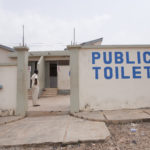The World Toilet Day (WTD) is an official United Nations (UN) observed on November 19. It was officially declared in 2013 at the 67th session of the UN General Assembly.
Toilets are important because access to a safe functioning toilet has a positive impact on public health, human dignity and personal safety.
According to the UN, “A toilet is not just a place where people pass faeces or waste, it is a life saver, dignity protector and opportunity maker.”
Statistics from the UN indicates that about 4.2 billion people live without safety-managed sanitation and 673 million people practice open defecation globally.
Therefore, WTD is celebrated to create awareness about these category of people living without toilets and also take necessary action so as to tackle the global sanitation crisis and also achieve one of the Sustainable Development Goals (SDGs).
The 2020 WTD day focuses on: “Sustainable Sanitation and Climate Change” as climate change is getting worse: flooding, drought and rising sea levels are threatening sanitation system, from toilet to septic tanks, to treatment plants, everyone must have sustainable sanitation and clean water, as well as hand washing facility to maintain health security.
The COVID-19 pandemic which has killed over 1.3 million people globally has further stressed the need for sustainable sanitation.
Sustainable sanitation begins with a toilet that effectively captures human waste in a safe accessible and dignified setting. The waste then gets stored in a tank which can later be emptied by a collection services or transported away by pipe work.
Lack of household toilet facilities affects men and women, especially women, forcing many of them, including young ladies, to travel long distances from their homes to defecate, as well as manage their menstrual necessities which make them vulnerable and in some cases exposes them to dangers like rape.
The UN adds that the practice has huge impact on Nigeria’s development, economically, as about 1.3 per cent (455 billion) of the nation’s Gross Domestic Product (GDP) is lost yearly to poor sanitation and open defecation.
Health wise, over 100 children under the age of five die annually of cholera contracted from water contaminated by human feaces leading to stunted growth and malnutrition in children.
It is sad that open defecation is practiced not only in rural areas, but also in some semi-urban areas, as some of houses do not have toilet facilities, and the practice is very dangerous to human health as human excreta contains a variety of microbes which includes about 106 pathogenic viruses.
The UN plans to end open defecation by 2030, and President Muhamadu Buhari has said Nigeria could not afford to wait till then, a determination which led him to sign Executive Order 009; a national campaign to make Nigeria open defecation-free by 2025.
If we are to get rid of open defecation by 2025, provision of latrines, proper sanitation awareness, behavioural change, communication and enhanced community-led total sanitation campaign and enforcement are the most likely joint strategies to enable both rural and pre-urban become open defecation-free.
Government, while working on eradicating poverty through various interventions, must also take bold steps by addressing this challenge of open defecation, not just by using the law, but by implementing the law and providing more toilet facilities.
Corporate organisations must also note that their effort is also required in terms of addressing the challenge through the provision of more toilet facilities, as well as sensitisation campaigns.
Therefore, every building must have a minimum of one toilet, and all three tiers of government should consider building efficient toilet facilities at markets, parks and at strategic areas of our roads because as bad as it may sound, open defecation is not practiced by the illiterate alone; the literate are also guilty of the act.
Nosimot Soneye, Abeokuta – [email protected]

 Join Daily Trust WhatsApp Community For Quick Access To News and Happenings Around You.
Join Daily Trust WhatsApp Community For Quick Access To News and Happenings Around You.


